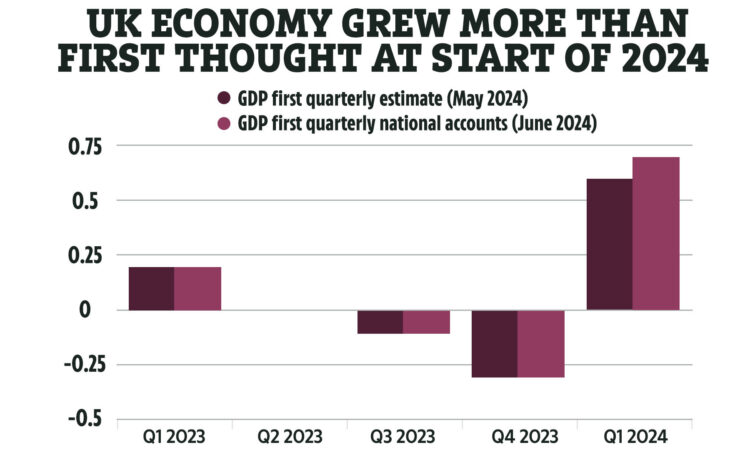
THE UK economy’s recovery from recession was stronger than previously thought in a boost for Rishi Sunak just days before the election.
New Gross Domestic Product (GDP) figures show it grew by 0.7% between January and March this year, according to revised figures from The Office for National Statistics (ONS).
Figures released last month estimated that the economy had grown by 0.6% over the quarter – but these have now been revised to 0.7%.
This is the fastest pace since 2021 and is positive news for the Prime Minister Rishi Sunak ahead of next week’s general election.
Mark Preskett, senior portfolio manager at Morningstar Wealth, said: “The upward revision to the UK’s Q1 GDP is encouraging and further evidence that the UK economy is recovering.
“The services upgrade – to 0.8% from 0.7% – backs what we have been seeing in inflation data.”
Figures released earlier this month revealed that the UK economy flatlined in April due to wet weather.
Economists still expect growth for the current quarter, however.
Thomas Pugh, economist at RSM UK, said: “All the data suggests that the economy is set to continue to rise in Q2.
“We then expect growth to accelerate in the second half of this year and into 2025 as sharply lower inflation, tax cuts and falling interest rates give households an income boost.”
The UK economy shrank by 0.3% in the last three months of 2023 meaning the UK tipped into a technical recession, defined as two or more quarters in a row of falling Gross Domestic Product (GDP).
However, experts said the recession was considered “mild” compared to others in recent history.
What it means for your money
This is good news, not just for the economy but for your finances too.
GDP is a measure of the economic output of companies, individuals and governments.
It’s also a measure of how healthy and prosperous an economy is.
A healthy economy is one where GDP is growing but if it stalls or is falling, it’s bad news for businesses and consumers.
Most economists, politicians and businesses want to see GDP rising steadily.
This is because it usually means people are spending more, more tax is paid to the government and workers get better pay rises.
A healthy economy usually means lower inflation, rising employment, less poverty, and more money in your pocket.
Lower inflation is good because it means prices don’t rise as fast, putting less financial pressure on households.
The consumer Prices Index (CPI) inflation stood at 2% in May, hitting the Bank of England’s (BoE) target.
It’s important to note when inflation falls that doesn’t mean prices have stopped rising, they are just increasing at a slower pace.
However, some experts warn households are still under immense pressure.
Lindsay James, investment strategist at Quilter Investors said: “The second half of 2024 seems likely to be slow to change gear, despite the energy of a probable new government, with any noticeable changes not likely to be felt until 2025.”
The BoE has been watching these figures closely as it decides whether to lower its base rate.
Markets are expecting the (BoE) to cut its base rate in August this year after policymakers kept it at 5.25% last week.
Interest rates currently stand at a 16-year high of 5.25%.
High street banks and lenders use the BoE base rate to set their own interest rates on mortgages, loans and savings accounts.
If it comes down, interest rates on mortgages, loans and savings accounts tend to fall too.
Mortgage lenders also tend to bring down rates in anticipation of the base rate falling.
Are you missing out on benefits?
YOU can use a benefits calculator to help check that you are not missing out on money you are entitled to
Charity Turn2Us’ benefits calculator works out what you could get.
Entitledto’s free calculator determines whether you qualify for various benefits, tax credit and Universal Credit.
MoneySavingExpert.com and charity StepChange both have benefits tools powered by Entitledto’s data.
You can use Policy in Practice’s calculator to determine which benefits you could receive and how much cash you’ll have left over each month after paying for housing costs.
Your exact entitlement will only be clear when you make a claim, but calculators can indicate what you might be eligible for.
How to protect your finances
Despite GDP growing, you might still be feeling the pinch from the higher cost of living.
But there are ways you can keep your cash safe.
Make sure you go through all your bank statements and accounts so you know what your income and outgoings are every month.
You can save money by moving to a cheaper mobile phone tariff or by axing subscriptions you don’t need like Netflix or Amazon Prime.
If you’ve got any outstanding debts, don’t ignore them as it will only make your financial situation worse.
Stay on top of what you owe and always repay priority debts.
There are plenty of organisations where you can seek debt advice for free.
You should also check what benefits you are eligible for as you might be able to claim without realising.
There is also emergency funding available for struggling households, which is dished out by local councils.
The Household Support Fund is designed to help those on a low income or benefits cover the cost of food, energy and general living costs.
What help is available varies depending on where you live as each council sets it own eligibility criteria.
It’s worth getting in touch with your local authority to see what you might be able to get.
You can find what council area you fall under by using the government’s council locator tool online.
Do you have a money problem that needs sorting? Get in touch by emailing [email protected].
Plus, you can join our Sun Money Chats and Tips Facebook group to share your tips and stories






